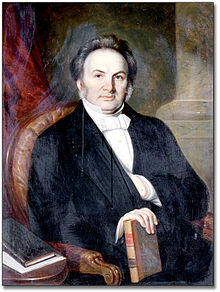Egerton Ryerson
| Egerton Ryerson | |
|---|---|

Portrait of Egerton Ryerson by Théophile Hamel
|
|
| Born |
Adolphus Egerton Ryerson 24 March 1803 Charlotteville Township, Norfolk County, Upper Canada |
| Died | 19 February 1882 (aged 78) Toronto, Ontario |
| Occupation | educator, minister |
| Known for | public education in Ontario |
| Spouse(s) | Hannah Aikman (m. 10 September 1828, d. 1832) Mary Armstrong (m. 1833) |
Adolphus Egerton Ryerson (24 March 1803 – 19 February 1882) was a Methodist minister, educator, politician, and public education advocate in early Ontario, Canada. He was the leading opponent of the closed oligarchy that ran the province, calling it the "Family Compact."
Ryerson was born in 1803 in Charlotteville Township, Upper Canada to Joseph Ryerson (1761-1854), a United Empire Loyalist, a Lieutenant in the Prince of Wales American Volunteers from Passaic County, New Jersey and Sarah Mehetable Stickney Ryerson and one of six siblings.
He joined the Methodist Episcopal Church at 17, and was forced to leave the home by his Anglican father. After leaving home, Ryerson worked as an usher in a London grammar school, before his father sent for him to return home. He returned home and farmed for a small period of time before leaving again, this time to Hamilton to attend Gore District Grammar School. In Hamilton, he studied Latin and Greek with such fervor that he became ill with a fever that almost claimed his life. This enabled him to become a Methodist missionary or circuit rider. His first post was the York region surrounding Yonge Street. The circuit took four weeks to complete on foot or horseback, as it encompassed areas with roads in extremely poor condition. However, the experience gave Ryerson a first hand look at the life of the early pioneer.
In 1826, sermons from John Strachan, Anglican Archdeacon of York, Upper Canada, were published asserting that the Anglican Church was, by law, the established church of Upper Canada. Methodists were singled out as American and therefore disloyal. Money was requested of the crown to allow the Anglican church to maintain ties to Great Britain. As Ryerson was the son of a Loyalist, this was an abomination. He emerged as Episcopal Methodism's most articulate defender in the public sphere by publishing articles (at first anonymously) and later books that argued against the views of Methodism's chief rival John Strachan and other members of the powerful Family Compact.
...
Wikipedia
